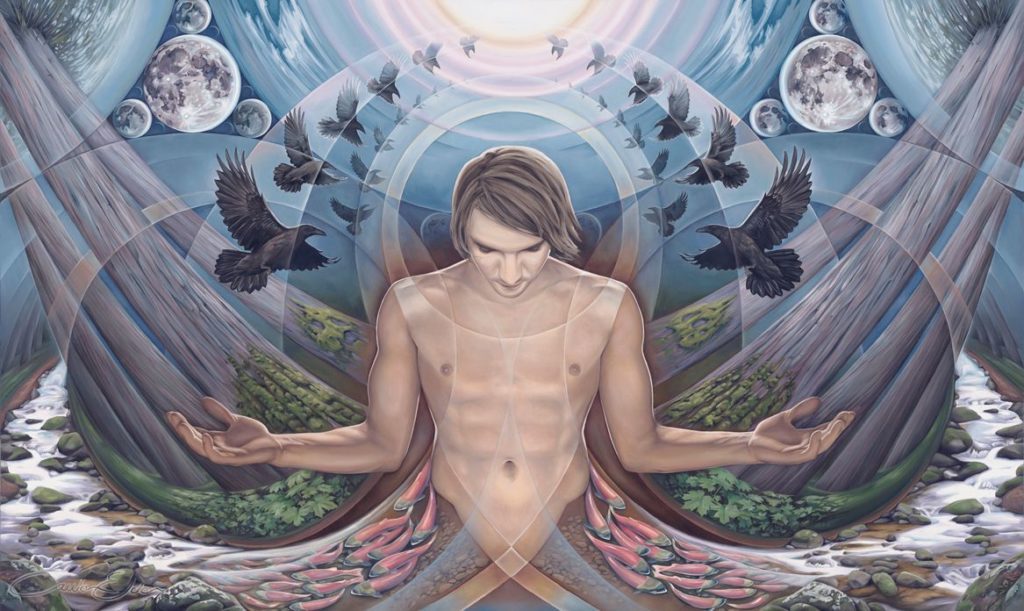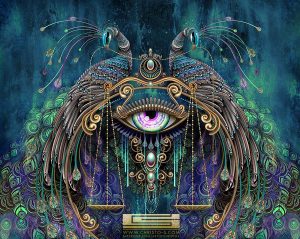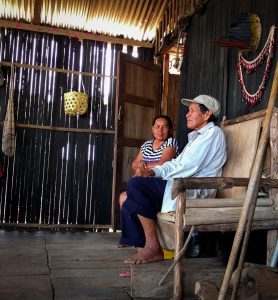Indigenous or Western Ayahuasca Shamans – Which is Best?

Art credit: Collin Elder
When choosing an ayahuasca facilitator or retreat center, it’s important to do solid research and make an informed decision. Those holding the ceremony are responsible not only for the mental and spiritual well-being of the participant, but also for their health and lives.
Ayahuasca is not like other psychedelics. The sacred Amazonian brew can open up far more intricate inner landscapes than most recreationally used substances can. Also unlike most chemically straightforward psychoactives, ayahuasca is a complex concoction composed of various alkaloids and other compounds. These chemicals’ profound mental and spiritual effects are rivaled by their potent impact on the body.
All this said, the potential for complications is huge. This is why, especially for beginners, drinking ayahuasca requires expert supervision and guidance.
Unfortunately, true experts are becoming harder to come by. As ayahuasca tourism booms, the market and traditions change in response to the influx of Western interest and, importantly, capital. The evolution of ayahuasca use has encouraged many members of indigenous and mestizo populations of the Amazon to become healers, and waves of gringos to perpetuate its global spread. With so many people pouring the brew, trustworthiness is becoming rare and paramount.
The question of whether to trust an indigenous or gringo ayahuasca facilitator or shaman isn’t just a question of his or her cultural background. Not anymore, at least, after all the significant changes in the culture of ayahuasca use in the Amazon.
Nowadays, a shaman isn’t automatically good because he or she comes from a native Amazonian community (even if they endured long-term training), just as a gringo curandero isn’t necessarily bad just because he or she appropriated ayahuasca and brought it to other lands and cultural contexts. And vice versa: an indigenous healer shouldn’t be labeled as a charlatan because they hold ceremonies abroad, just like spending some time in the Amazon doesn’t automatically make a gringo a competent shaman.
Everyone deserves benefit of the doubt, with an accent on the doubt part. So, let’s first look into where the point lies at which we can start to make cultural distinctions between facilitators or shamans.
‘Good’ vs ‘Bad’ Shaman First. Gringo vs Indigenous Shaman Second.
There are certain qualities that a ‘good’ shaman or facilitator must possess, and it is necessary to ask them, and any other relevant people, some crucial questions before committing to drinking with them. These qualities can and do overlap substantially with what we would call shamanic ‘qualifications,’ but there are also distinctions pertaining to the nature of the facilitator’s personality, their knowledge, present state of being, and ability to connect both with the drinkers and the spirit realm.
For example, a ‘good’ shaman may do everything right during the ceremony, but may not speak English (nor Spanish) and be able to fully communicate with the drinker during or after the ceremony. The language barrier is in that case a problem, but it doesn’t make the shaman any less ‘good’ or ‘qualified.’
The traits and skills of a ‘good’ shaman, as well as what makes for ‘good’ ceremony facilitation are thoroughly discussed in this article, which we highly recommend you read before continuing.
If we can settle on the rationale that drinking ayahuasca needs to be done only with a ‘good’ facilitator or shaman, then choosing the right, or ‘great’ one comes down to the ‘style’ or direction of shamanism they employ and how compatible it is with your personal preference and need (for healing or growth). These matters may, to an extent, be indeed determined by the cultural background and specific aspects of knowledge and experience coming down to the indigenous/mestizo vs gringo distinction. But it’s also not that simple, as many factors are at play.
Art credit: Chris Saunders
The Comparison
So, let’s review some of the potentially disparate pros and cons of facilitators from both cultures and how they may impact the experience.
Indigenous/mestizo shamans – Pros
The most self-evident upside of drinking with a ‘good’ Amazonian shaman is that they come from the native cultural setting of ayahuasca and plant medicine in general, and should possess original knowledge of ancient healing traditions. They heal the way their people have been healing for decades or centuries, and this exact manner of healing with all its particularities is established for a good reason – because it has been proven to work.
‘Good’ Amazonian shamans also have many months or years of training and years or decades of practical experience behind them. Dieting with ayahuasca and other healing plants brought them in close connection with the spirits of the plants, animals, natural objects, and ancestors. They can invoke these spirits in their healing and general ceremony management. They can diagnose illnesses and know exactly which plant to use to heal which organ or type of energetic imbalance. They can set up and control a rock-solid safe space, manipulate the levels of mareación (ayahuasca effects), intuit when a participant needs assistance, perform authentic and powerful traditional cleansings, protect from and borderline exorcise negative energies and malevolent spiritual afflictions.
One of the most important things that can make a ‘good’ Amazonian shaman ‘great’ is their ability to sing sacred songs, icaros. Icaros are highly valued among the indigenous and mestizo populations. Shamans receive them from the plant spirits and wield them in ceremony for a variety of healing and protection purposes. Some shamans have internal libraries of thousands of icaros, and are able to generate new ones in real time as per the need of the collective ceremony space or individual in distress. This is not improvisation, this is channeling the healing vibrations of the spirits. Anyone who has experienced the reverberation of icaros from the souls of true shamans can confirm their visionary and healing value, and that they are the product of years of communion with, and complete devotion to plant healing spirits.
Indigenous/mestizo shamans – Cons
Even though they may possess otherworldly knowledge of spiritual afflictions and their healing, even the ‘good’ Amazonian shamans often lack the intricate knowledge of Western medicine, pharmacology, and psychology. As such, thorough medical and psychological evaluation can be amiss in indigenous ceremony and retreat facilitation. Although ayahuasca is generally safe for most people, individuals with underlying cardiovascular conditions, severe psychological impairments, or on chronic medication may be vulnerable to health complications. Amazonian shamans deemed ‘good’ or even ‘great’ by their local populations may be unfamiliar with these.
Furthermore, indigenous and mestizo shamans may not understand the complex neuroses, repressions, and other defense mechanisms so abundant in the contemporary Western world. These issues are, ultimately, on the drinker to resolve themselves with the insight they gain through the ayahuasca experience, but expert guidance would, of course, be more than welcome. Still, many shamans are not experienced and well-versed in these mental processes and may not be able to offer this kind of assistance.
Additionally, even if they conduct their ceremonies perfectly, they may not have the verbal communication skills, or even the interest, to consult with their Western guests after the ceremony and aid their integration efforts. This doesn’t necessarily make them ‘bad,’ it just may not align with their ‘style’ of healing. We are accustomed to talking more about our inner experiences and perceptions than the typical native Amazonian is.
One more point is that, although we often characterize indigenous shamans as saint-like individuals, the truth is that they are human beings just as we are – imperfect products of nature and nurture. ‘Good,’ and even ‘great’ shamans can eventually become brujos (sorcerers), and it may not be noticed or acknowledged by others due to the long-standing respect and reputation they hold in the community. It may not be their fault or choice; they could have been targeted by another brujo, or just been victims of tragic circumstances creating vulnerability in them which malevolent entities can exploit. My personal experience can attest to this: I was not comfortable drinking with a female shaman in Ecuador, whom everyone was highly praising, after witnessing her overall demeanor and the way she conducted ‘healing’ with those who came to her. Her brother had tragically died the year before I visited her, and my reasoning is that this event may have broken her and facilitated the festering of dark entities within.
Finally, ‘good’ shamans also age and become weak, yet may continue practicing. Another shaman I stayed with, the elder of a highly reputed family of healers and definitely a master healer in his time, conducted ayahuasca ceremonies almost every evening in his eighties when I was there. After attending a ceremony sober and witnessing his departure due to tiredness around 10pm, I decided I would not want to drink with him and be left alone while under the influence.
Photo: Xavier Francuski
Gringo shamans – Pros
The benefits of drinking with ‘good’ gringo shamans are, in essence, the flipsides of the potential downsides of drinking with native Amazonians. ‘Good’ gringo shamans may have better knowledge of Western health particularities and pharmaceutical interactions ayahuasca may have. Thus, they may be able to do medical screening and advisory more thoroughly, and in general take this aspect of drinking ayahuasca more seriously than their Amazonian counterparts. They also may have carefully devised procedures in place in case of medical emergencies. This is one of the reasons why many of the well-renowned ayahuasca retreat centers in the Amazon are owned and managed by Westerners.
Additionally, gringos are generally more acquainted with the various psychological states Westerners are looking to heal through the use of ayahuasca. As such, they may provide extensive individual monitoring, care, and attentiveness to guests throughout their healing process, which can be immensely helpful with ayahuasca integration. With no language barrier, discussing complex mystical experiences and how to make sense of them can make the journey unravel much more smoothly.
Going further, the particulars of conducting a business, which may arguably be more familiar to those Westerners who are accustomed to doing things by the book, can be a big advantage for those debating between the two cultures for what is, in the end, a paid service. Reputable Western-run retreats and ceremonies normally include high comfort and a familiar atmosphere of Western service, delivering on their promises and following all itineraries as intended. This can be a deciding point for those who value enjoying a hefty shard of familiarity outside their comfort zone.
Finally, gringos can also become damn good authentic shamans. If they relinquish their cultural baggage, learn from a master indigenous or mestizo curandero, and go through the long, intense training and dieting process, it is possible that they may completely internalize the original cultural aspects of ayahuasca and other plant medicine use, effectively embodying the best of both worlds. My personal best ayahuasca ceremony was with a French shaman who had spent decades in Peru and Ecuador, dieting and learning from a powerful maestro. He has an indigenous family, speaks Quichua like a native, sings icaros with the same gravitas I’ve heard in indigenous shamans, and, truly, has outstanding otherworldly powers.
Gringo shamans – Cons
On the other hand, even the ‘good’ gringo shamans may not be able to transcend some Western cultural remnants and immerse themselves fully into the Amazonian lore and tradition. Without years of proper shamanic training and life among the natives, it is less likely that they will naturally internalize the Amazonian healing traditions and more likely that they will try to emulate them, with varying degrees of success. For example, perhaps they never receive their own icaros from the plant spirits, but sing the ones their maestro taught them, or just improvise songs without truly acting as conduits of the deities. Maybe they don’t even sing the icaros, but instead put on a playlist; this is alright if the music is absolutely suitable to the ayahuasca ceremony space, but it can lack the purity and authenticity of the icaros, and the dynamic option to sing a personalized healing song according to the specific atmosphere of the group or the specific needs of an individual.
Ceremonies outside of the Amazon are usually held in a highly underground fashion due to the illegality of ayahuasca. This is why they may generally occur more rarely than in the Amazon, and why they can, at times, be overpacked due to high demand. Hosting too many people in a ceremony isn’t necessarily a problem per se. However, depending on the nature of the group, even those who are ‘good’ at ceremony management may have complications with a critical number of people to take care of. Additionally, with high numbers of participants, the reality is that traveling gringo shamans (much more common travelers than internationally-bound Amazonian shamans, who usually visit only one or a few locations) make a lot of money doing ceremonies. Even the ‘good’ ones, who can hold proper space and sing proper icaros, aren’t impervious to the comforts of cash, and this may, to an extent, influence their motivation for serving the medicine.
Finally, gringo shamans, even the ones who have considerable time in the Amazon under their belt, still originate from a Western society. Their early childhoods were likely modeled by individualism and materialism, and the ego that is formed from this period is deeply rooted. Unlike in native Amazonians, who are raised by a collective where competitiveness and gain are not the main goals, these foundational traits take a lot more to dismantle, if that can ever even be done. This may make core shaman attributes like true empathy and humility more difficult to attain for gringos.
What Do You Need From Your Ayahuasca Experience?
Hopefully, this article adequately portrayed the complexity and non-dualist nature of the distinction between native Amazonian and gringo ayahuasca shamans and facilitators. Both can be ‘good,’ ‘bad,’ and ‘great.’ Both can be ‘qualified’ in their own ways, and gringos can even get ‘qualified’ in the same way that Amazonian shamans are, with enough time and devotion. Finally, considering that the ‘goodness’ of one’s shamanic skills can be judged more objectively, and that nothing below a ‘good’ shaman should ever suffice for anyone to drink with, our opinion is that your choice shouldn’t so much depend on the cultural background of the facilitator, but more on your personal preference and need.
If you need deep spiritual/energetic healing, it’s likely that a native shaman would be of more help. If you feel like your issues could benefit more from an approach that involves more Western psychological insight and conversation, a gringo shaman may be more suitable. If you are just looking to drink ayahuasca for personal growth purposes, then it’s more of a question of your preference. If you feel ready to leave your comfort zone completely behind, spend time practicing your broken Spanish, and immerse yourself fully into an Amazonian environment, go for a native shaman. If, however, having a slice of familiarity feels more comfortable, choose a gringo shaman or a Western-managed retreat center. And, finally, if you’re not considering international travel, but joining a ceremony taking place in your vicinity, opt for whoever is holding it, as long as you make sure to check the reputation and legitimacy of the facilitator well.
Stay safe and journey far.
Further reading: Rak Razam’s The Ayahuasca Sessions: Conversations with Amazonian Curanderos and Western Shamans


